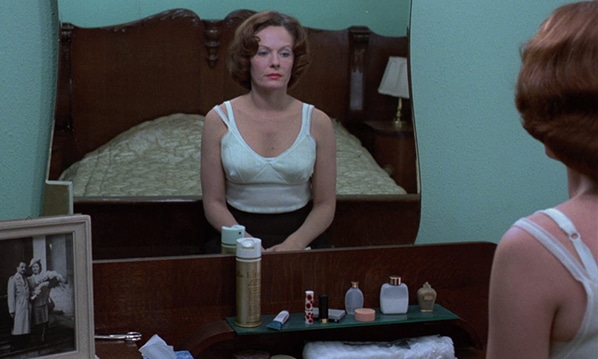The Critics’ top 20 Greatest Films of All Time are:
1 Jeanne Dielman, 23, quai du Commerce, 1080 Bruxelles (Chantal Akerman, 1975)
2 Vertigo (Alfred Hitchcock, 1958)
3 Citizen Kane (Orson Welles, 1941)
4 Tokyo Story (Ozu Yasujiro, 1953)
5 In the Mood for Love (Wong Kar-wai, 2001)
6 2001: A Space Odyssey (Stanley Kubrick, 1968)
7 Beau travail (Claire Denis, 1998)
8 Mulholland Dr. (David Lynch, 2001)
9 Man with a Movie Camera (Dziga Vertov,1929)
10 Singin’ in the Rain (Stanley Donen & Gene Kelly, 1951)
11 Sunrise: A Song of Two Humans (F.W. Murnau, 1927)
12 The Godfather (Francis Ford Coppola, 1972)
13 La Règle du jeu (Jean Renoir, 1939)
14 Cléo from 5 to 7 (Agnès Varda, 1962)
15 The Searchers (John Ford, 1956)
16 Meshes of the Afternoon (Maya Deren & Alexander Hammid, 1943)
17 Close-Up (Abbas Kiarostami, 1989)
18 Persona (Ingmar Bergman, 1966)
19 Apocalypse Now (Francis Ford Coppola, 1979)
20 Seven Samurai (Akira Kurosawa, 1954)
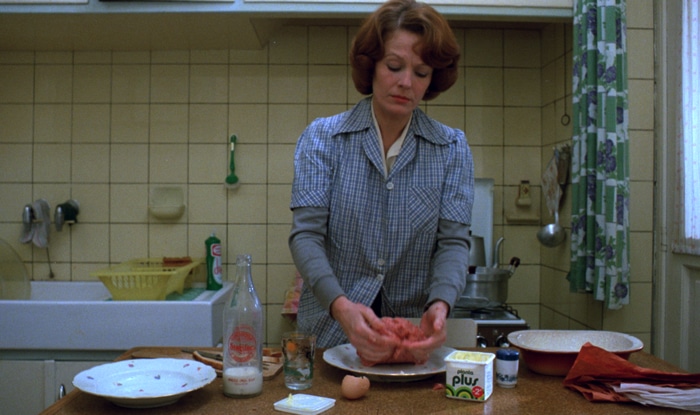
Jeanne Dielman 1 @BFI National Archive
Since it was first conducted in 1952, Sight and Sound’s Critics’ poll has become a hotly anticipated event within the global film community as it represents a litmus test for where film culture stands. This year’s poll reached a wider and more diverse group than ever before and incorporates the top 10 lists of over 1,600 participants from all corners of the globe who voted for more than 4,000 films overall. This compares to the 846 who were asked 10 years ago and reflects a variety of factors, including the more diverse group of contributors voting in the poll and the impact and increased influence of film commentators internationally via the internet. It may also be explained in part by the explosion of access to a wider selection of films, thanks to the proliferation of movies available to view on numerous streamers, boutique Blu-ray and DVD collections, the increase of TV channels dedicated to movies and curated film seasons, all of which have helped to create a more cine-literate contributor. A largely unimaginative and list then which has not really changed much since it first came into being. The voters were asked to interpret ‘Greatest’ as they chose: to reflect the film’s importance in cinematic history, its aesthetic achievement, or perhaps its personal impact in their own life and their view of cinema.
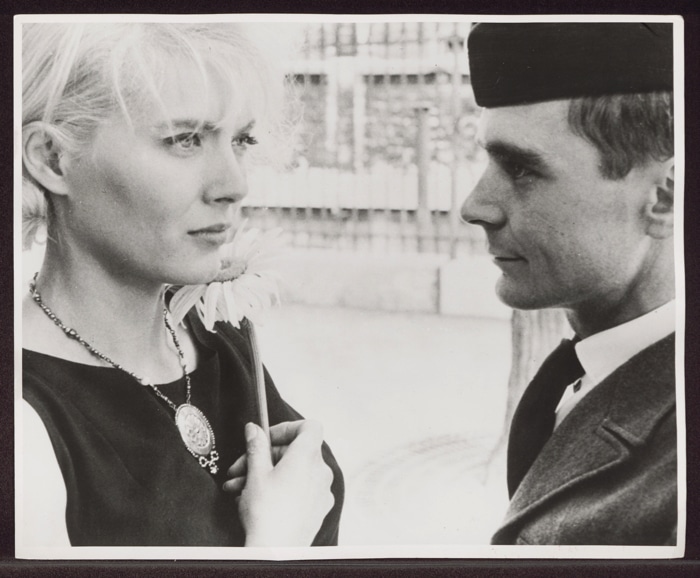
Cleo 5-7 – Number 7 – @Bfi National Archive
The wider and more diverse electorate appears to have had an impact on the diversity of the top 100 films. Chantal Akerman’s Jeanne Dielman, 23 quai du Commerce, 1080 Bruxelles and Claire Denis’s Beau travail were the only female filmmakers’ films in the 2012 top 100. This year’s poll now features 11 films by female filmmakers in the top 100, and four in the top 20, with new entries by Chantal Akerman – her second entry is News from Home at number 52 – Agnès Varda’s Cléo from 5 to 7 at number 14 and The Gleaners and I in number 67, Maya Deren’s Meshes of the Afternoon (co-directed with Alexander Hammid) in 16th place, Vera Chytilová’s Daisies at number 28, Céline Sciamma’s Portrait of a Lady on Fire in 30th place, Barbara Loden’s Wanda at number 48, Jane Campion’s The Piano at number 50 and Julie Dash’s Daughters of the Dust in 60th place.
In 2012 there was one film by a Black filmmaker listed in the top 100 – Djibril Diop Mambéty’s Touki Bouki, at number 93. In 2022 there are seven titles in the top 100 by prominent Black filmmakers. Touki Bouki has climbed to 67th place, with new entries for Spike Lee’s Do the Right Thing in 24th place, Charles Burnett’s Killer of Sheep at number 43, Julie Dash’s Daughters of the Dust and Barry Jenkins’s Academy Award®-winning Moonlight in joint 60th place, and Jordan Peele’s Get Out and Ousmane Sembène’s Black Girl jointly at number 95.
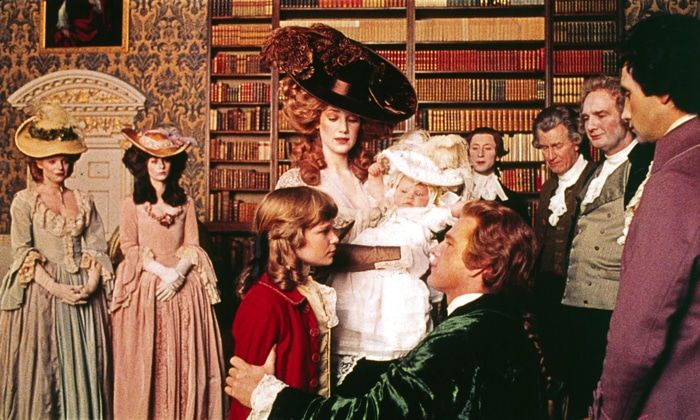
Barry Lyndon – No 45 @Bfi National Archive
In 2012, two films from the last two decades made the top 100 – Wong Kar-wai’s In the Mood for Love and David Lynch’s Mulholland Dr. The top 100 in 2022 features nine films from the last two decades, with new entries including Bong Joon Ho’s Academy Award®-winning Parasite at number 90, Hayao Miyazaki’s Oscar®-winning Spirited Away in 75th place and Apichatpong Weerasethakul’s Tropical Malady at number 95, as well as The Gleaners and I, Portrait of a Lady on Fire, Moonlight and Get Out. The top UK film is Stanley Kubrick’s Barry Lyndon at number 45, followed by Carol Reed’s The Third Man at number 63 (up from 73rd). Two films by Michael Powell and Emeric Pressburger feature in the top 100: The Red Shoes in 67th place and A Matter of Life and Death at number 78 (up from 90th).
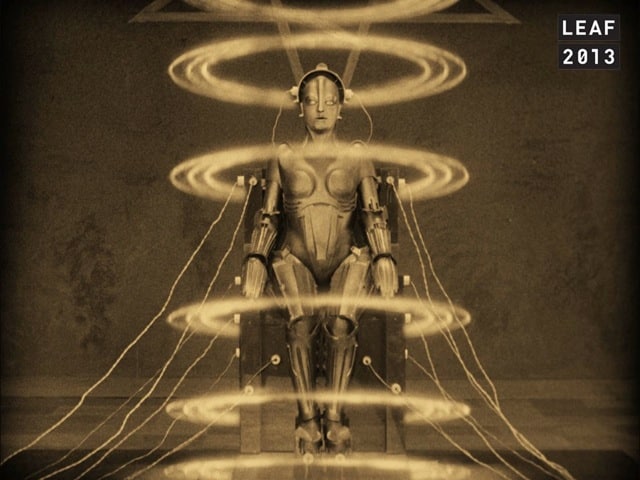
Metropolis @Bfi National Archive
Two silent films have made the top 20: F.W. Murnau’s Sunrise: A Song of Two Humans and Dziga Vertov’s Man with a Movie Camera, which is also the only documentary to make the top 20. There are nine films from the silent era in the top 100, including Carl Theodor Dreyer’s The Passion of Joan of Arc, Charlie Chaplin’s City Lights and Modern Times, Buster Keaton’s Sherlock Jr. and The General, Sergei Eisenstein’s Battleship Potemkin and Fritz Lang’s Metropolis.
Films that have been knocked out of the top 100 include Erich von Stroheim’s Greed, D.W. Griffith’s Intolerance, Luis Buñuel’s Un chien andalou, Jean Renoir’s Partie de campagne and La Grande Illusion, Orson Welles’s The Magnificent Ambersons and Touch of Evil, Michael Powell and Emeric Pressburger’s The Life and Death of Colonel Blimp, Marcel Carné’s Les Enfants du paradis, David Lean’s Lawrence of Arabia, Michelangelo Antonioni’s L’eclisse, Sam Peckinpah’s The Wild Bunch, Werner Herzog’s Aguirre, Wrath of God, Roman Polanski’s Chinatown, Francis Ford Coppola’s The Godfather Part II, Robert Altman’s Nashville and Martin Scorsese’s Raging Bull.
These are my own personal choices, and my reason for making them. Of course these are only ten of my favourites, but I’ve tried to choose films not just for their technical strength but also for their powerful effect on me. I want to come away feeling moved, enlightened, inspired or changed in some way. They need to stand up to the test of time. All these films have good performances, a solid script and strong visual allure, but there has to be an X factor too. And that lies at the heart of my choices.
- MY 20th CENTURY (1989)
Director(s): Ildiko Enyedi (Hungary)
Comment: An elegant inventive whisper-light reverie about civilisation at the turn of the 20th Century seen from a woman’s point of view.
- BARRY LYNDON (1976)
Dir: Stanley Kubrick (US)
Comment: This epic saga has something new to discover each time I watch it. An extraordinary treasure trove of images, performances and historical details captured by John Alcott and bound up in an iconic score. If I could choose one film to take to my desert island it would be this one.
- SUPER FLY (1972)
Dir: Gordon Parks Jr (US)
Comment: I discovered this gem at a Black cinema retrospective at Locarno Film Festival some years ago. A heady breath of New York in the early 1970s it captures the daily life of a cocaine dealer (Ron O’Neal) and his lover (Sheila Frazier) who live life on a knife edge with such style and gutsiness – Curtis Mayfield’s score it just the icing on the cake. And of course costume design from Nate Adams sets the tone.
- THE TENANT (1976)
Dir: Roman Polanski (France)
Comment: Paris is the sombre star of this twisted psychodrama, a portrait of paranoia punctured by lewd moments of humour in a scabrid script. Polanski is the timid outsider gradually cowered into submission, and as the horror unravels to Philippe Sarde’s plangent score, all sorts of skeletons emerge from the past and the present. Bang up to date with its immigration theme, yet constantly resonating with the Holocaust, and echoing the pity, shame and humiliation of its central character, this is an endlessly haunting thriller that left Polanski empty-handed at Cannes (1976) after surely one of the most extraordinary performances of the 20th century.
- KOBIETA SAMOTNA(1987)
Dir: Agnieszka Holland (Poland)
Comment: Shot on a hand held camera, this simple tragedy speaks volumes about the abject emotional misery and privation suffered by its central character Irena who lives alone on the outskirts of Communist era Wroclaw with only her 8 year old son for company. A brief period of happiness leads once again to desperation and gloom. Unforgettable in its stark depiction of life in eighties Poland. Won the Special Jury prize at Polish Film Festival 1988
- THE CRANES ARE FLYING (1957)
Dir: Mikhail Kalatozov (Soviet Union)
Comment: Kalatozov led Soviet cinema back to the lyricism of Pudovkin and Eisenstein away from the realism of the Stalin era in a poignant drama portraying dark times with such elegance, its everlasting themes of love, war and courageous sacrifice enveloped in the velvety visuals of DoP Sergey Urusevsky. Tatyana Samoylova is mesmerising as Veronika and won Best Actress at Cannes where the film won the Palme d’Or in 1958.
- DON’T LOOK NOW (1987)
Dir: Nicolas Roeg (UK)
Comment: A beautiful horror masterpiece: chilling, soulful, romantic in its depiction of extreme grief, regret and yearning for love lost, in all its forms. Totally relatable and yet mysterious, treacherous and unreachable. So many emotions well up when watching this film. It resonates with a grief that is palpable. The tragedy of its story remains in the mind forever.
- THE GREAT ADVENTURE (1953)
Director(s): Arne Sucksdorff (Sweden)
Comment: A lyrical black & white Swedish cinema verite docudrama that pictures a year on a farm in remote Sweden where a man lives with his family in the heart of the forest, the director doubling us as the pipe-smoking father and DoP. The film won prizes at Cannes and Berlin for the poetic way Sucksdorff combines wildlife photography with a gripping storyline that plays out like a thriller with touches of humour, the local fauna unwittingly providing the characters: owls, otters, pine-martens, rabbits, squirrels and a lynx all take part in their natural habitat in a deeply forested 1950s Sweden. Enchanting.
- NOSFERATU THE VAMPYRE (1979)
Director(s): Werner Herzog (Germany)
Comment: The vampire legend is brought to life in this hauntingly beautiful fantasy fable that takes us into the realms of darkness and beyond with an atavistic quality that strikes at the core of our deepest fears. The power and complexity of the performances, the magnificence of the sets and Wagner’s score make this an all time classic masterpiece that feels fresh and deeply thought-provoking each time you watch it.
- IN THE MOOD FOR LOVE (2000)
Dir: Wong Ka Wai (Hong Kong)
A smoulderingly sensual love story unfolds between two Tony Leung and Maggie Cheung, in 1962 Hong Kong. Enchanting and suggestive, the film floats along like a gorgeous cloud of perfume buoyed by delicately suppressed emotions and vibrant visual allure.
SIGHT AND SOUND POLL 2022
